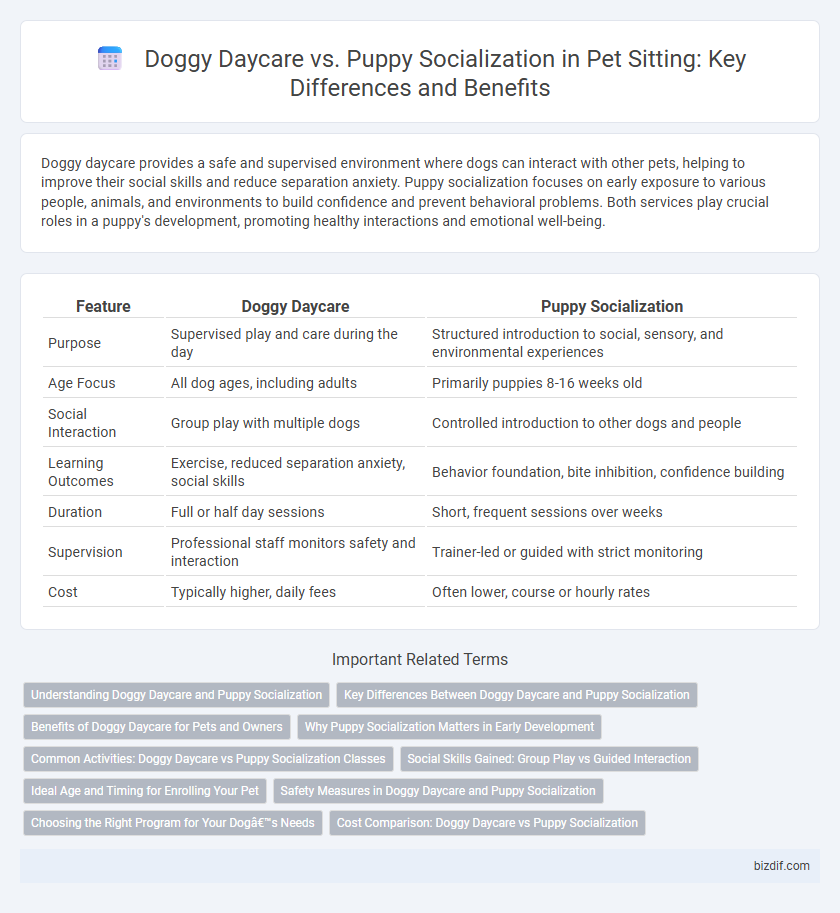Doggy daycare provides a safe and supervised environment where dogs can interact with other pets, helping to improve their social skills and reduce separation anxiety. Puppy socialization focuses on early exposure to various people, animals, and environments to build confidence and prevent behavioral problems. Both services play crucial roles in a puppy's development, promoting healthy interactions and emotional well-being.
Table of Comparison
| Feature | Doggy Daycare | Puppy Socialization |
|---|---|---|
| Purpose | Supervised play and care during the day | Structured introduction to social, sensory, and environmental experiences |
| Age Focus | All dog ages, including adults | Primarily puppies 8-16 weeks old |
| Social Interaction | Group play with multiple dogs | Controlled introduction to other dogs and people |
| Learning Outcomes | Exercise, reduced separation anxiety, social skills | Behavior foundation, bite inhibition, confidence building |
| Duration | Full or half day sessions | Short, frequent sessions over weeks |
| Supervision | Professional staff monitors safety and interaction | Trainer-led or guided with strict monitoring |
| Cost | Typically higher, daily fees | Often lower, course or hourly rates |
Understanding Doggy Daycare and Puppy Socialization
Doggy daycare provides a supervised environment where dogs engage in structured play, social interaction, and exercise to promote physical health and reduce separation anxiety. Puppy socialization focuses on exposing young puppies to various stimuli, people, and other animals during a critical developmental period to foster behavioral adaptability and prevent future aggression or fear. Both services support canine development, with doggy daycare emphasizing ongoing social skills and puppy socialization targeting early behavioral foundations.
Key Differences Between Doggy Daycare and Puppy Socialization
Doggy daycare offers structured, supervised group play sessions for dogs of various ages, promoting social skills and exercise in a controlled environment. Puppy socialization focuses specifically on exposing young puppies to diverse stimuli, people, and gentle interactions to build confidence and prevent behavioral issues later in life. The key difference lies in the age-specific goals: puppy socialization emphasizes critical developmental stages, while doggy daycare supports ongoing social and physical needs of adult dogs.
Benefits of Doggy Daycare for Pets and Owners
Doggy daycare offers structured socialization, physical exercise, and mental stimulation, reducing separation anxiety and destructive behaviors in pets. Owners benefit from peace of mind knowing their dogs are supervised in a safe environment, promoting consistent routines and improved behavior at home. This service also supports early social skills development, essential for puppies to grow into well-adjusted adult dogs.
Why Puppy Socialization Matters in Early Development
Puppy socialization plays a critical role in early development by exposing young dogs to diverse environments, sounds, people, and other animals, which helps prevent fear and aggression later in life. Unlike doggy daycare, which primarily provides supervised care and playtime, structured puppy socialization focuses on building positive experiences that promote confidence and adaptability. Early socialization enhances a puppy's behavioral health, making training easier and fostering well-adjusted adult dogs.
Common Activities: Doggy Daycare vs Puppy Socialization Classes
Doggy daycare typically offers group play, supervised exercise, and basic obedience practice, creating a controlled environment for dogs to interact and burn off energy. Puppy socialization classes focus on exposing puppies to various stimuli, such as sounds, people, and other animals, alongside foundational training exercises like sit, stay, and leash walking. Both settings emphasize social development but differ in structure and goals, with daycare fostering regular social interaction and classes concentrating on early behavioral learning.
Social Skills Gained: Group Play vs Guided Interaction
Doggy daycare promotes social skills through group play, allowing puppies to interact naturally with multiple dogs, which enhances their ability to navigate various social cues and behaviors in a dynamic environment. Puppy socialization focuses on guided interaction, where controlled and supervised sessions teach puppies appropriate responses and build confidence with both dogs and humans. Both approaches contribute to well-rounded social development by balancing spontaneous group experiences with structured learning opportunities.
Ideal Age and Timing for Enrolling Your Pet
Doggy daycare is ideal for dogs aged 12 weeks and older, providing a controlled environment for social interaction and play, essential for behavioral development. Puppy socialization classes are most effective when started between 7 to 16 weeks of age, a critical period for learning social cues and preventing future anxiety or aggression. Enrolling your pet during these windows ensures optimal social growth and adapts to their developmental needs.
Safety Measures in Doggy Daycare and Puppy Socialization
Doggy daycare facilities implement strict safety measures such as supervised play, vaccination requirements, and secure environments to prevent injuries and disease transmission. Puppy socialization emphasizes controlled interactions with vaccinated dogs and exposure to varied stimuli to build confidence while minimizing health risks. Both approaches prioritize monitoring behavior closely to ensure a safe, positive experience for pets.
Choosing the Right Program for Your Dog’s Needs
Doggy daycare provides structured supervision and playtime tailored for adult dogs, enhancing social skills and reducing separation anxiety. Puppy socialization programs focus on early development, exposing young dogs to various stimuli, people, and other animals to foster confidence and proper behavior. Selecting the right program depends on your dog's age, temperament, and specific socialization needs for optimal growth and well-being.
Cost Comparison: Doggy Daycare vs Puppy Socialization
Doggy daycare typically costs between $25 and $50 per day, providing structured supervision and playtime, while puppy socialization classes range from $100 to $200 for a multi-week course focusing on behavior and training skills. Investing in puppy socialization can reduce future expenses related to behavioral issues, whereas doggy daycare offers immediate engagement and exercise but may accumulate higher costs over time. Evaluating long-term benefits against upfront fees helps pet owners choose the best financial option for their puppy's development.
Doggy daycare vs Puppy socialization Infographic

 bizdif.com
bizdif.com